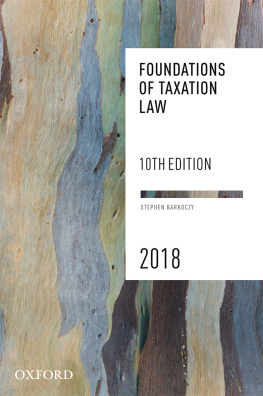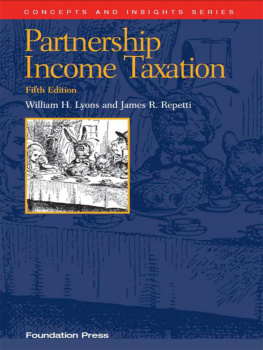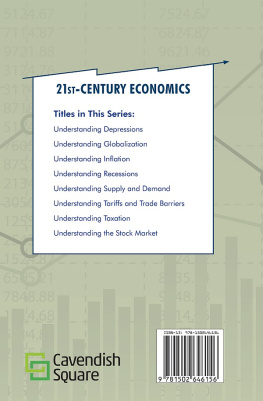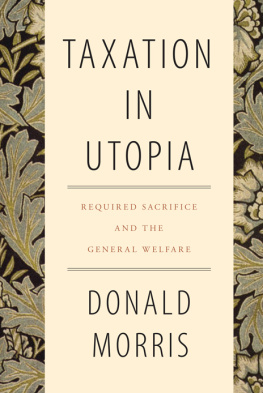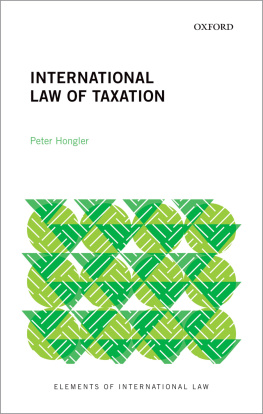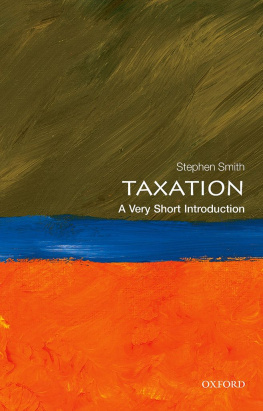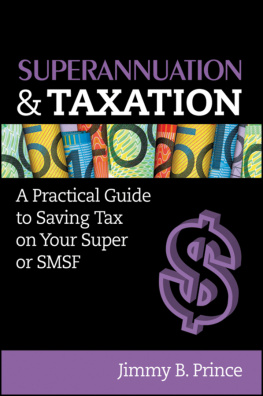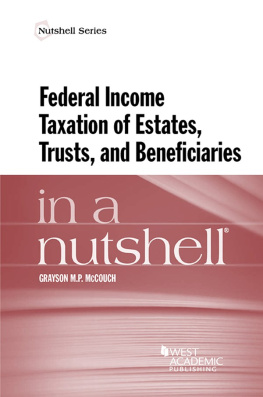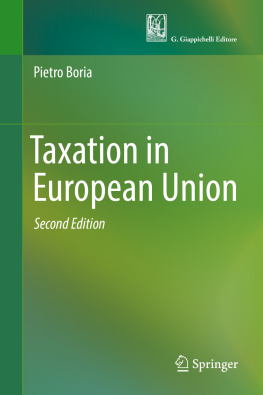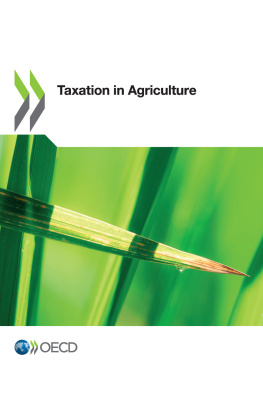Foundations of Taxation Law
Here you can read online Foundations of Taxation Law full text of the book (entire story) in english for free. Download pdf and epub, get meaning, cover and reviews about this ebook. year: 2017, genre: Politics. Description of the work, (preface) as well as reviews are available. Best literature library LitArk.com created for fans of good reading and offers a wide selection of genres:
Romance novel
Science fiction
Adventure
Detective
Science
History
Home and family
Prose
Art
Politics
Computer
Non-fiction
Religion
Business
Children
Humor
Choose a favorite category and find really read worthwhile books. Enjoy immersion in the world of imagination, feel the emotions of the characters or learn something new for yourself, make an fascinating discovery.
Foundations of Taxation Law: summary, description and annotation
We offer to read an annotation, description, summary or preface (depends on what the author of the book "Foundations of Taxation Law" wrote himself). If you haven't found the necessary information about the book — write in the comments, we will try to find it.
Unknown: author's other books
Who wrote Foundations of Taxation Law? Find out the surname, the name of the author of the book and a list of all author's works by series.
Foundations of Taxation Law — read online for free the complete book (whole text) full work
Below is the text of the book, divided by pages. System saving the place of the last page read, allows you to conveniently read the book "Foundations of Taxation Law" online for free, without having to search again every time where you left off. Put a bookmark, and you can go to the page where you finished reading at any time.
Font size:
Interval:
Bookmark:

Foundations
of Taxation
Law
10th Edition
Stephen Barkoczy


Oxford University Press is a department of the University of Oxford.
It furthers the Universitys objective of excellence in research,
scholarship, and education by publishing worldwide. Oxford is a registered
trademark of Oxford University Press in the UK and in certain other
countries.
Published in Australia by
Oxford University Press
253 Normanby Road, South Melbourne, Victoria 3205, Australia
Oxford University Press 2016
The moral rights of the authors have been asserted.
First edition published January 2009
Second edition November 2009
Third edition December 2010
Fourth edition October 2011
Fifth edition October 2012
Sixth edition October 2013
Seventh edition November 2014
Eighth edition January 2016
Ninth edition January 2017
Tenth edition January 2018
All rights reserved. No part of this publication may be reproduced, stored in a retrieval system, or transmitted, in any form or by any means, without the prior permission in writing of Oxford University Press, or as expressly permitted by law, by licence, or under terms agreed with the appropriate reprographics rights organisation. Enquiries concerning reproduction outside the scope of the above should be sent to the Rights Department, Oxford University Press, at the address above.
You must not circulate this work in any other form and you must impose this same condition on any acquirer.
Reproduction and communication for educational purposes
The Australian Copyright Act 1968 (the Act) allows a maximum of one chapter or 10% of the pages of this work, whichever is the greater, to be reproduced and/or communicated by any educational institution for its educational purposes provided that the educational institution (or the body that administers it) has given a remuneration notice to Copyright Agency Limited (CAL) under the Act.
For details of the CAL licence for educational institutions contact:
Copyright Agency Limited
11/66 Goulburn Street
Sydney NSW 2000
Telephone: (02) 9394 7600
Facsimile: (02) 9394 7601
Email: info@copyright.com.au

This edition edited by Trischa Mann
Text design by Denise Lane, Sardine Design
Cover image: Shutterstock
Printed by Ligare
FOREWORD TO THE FIRST EDITION
Foundations of Taxation Law is an impressively ambitious project impressively executed. The aim of the book is said in the preface to be to provide a concise introduction to the policy, principles and practice of the Australian federal taxation system. Anyone acquainted with that system will appreciate how large and difficult a task that is. Stephen Barkoczy has brought to bear many years of teaching and practice in tax in the production of this substantial contribution to the literature on tax law, policy and practice in Australia. His teaching skills are evident in the exposition of complex and difficult issues in a systematic and clear language reflecting the kinds of questions which students might frequently have asked him. The text, however, is thoroughly informed by many years of practice and experience in tax law, policy and practice. The value of this book lies not only in its clarity and breadth of coverage. Readers will find throughout the book further references to pursue in more detail the many concepts and issues considered by the author. Teachers in taxation will undoubtedly find useful as a teaching tool both the text and the many detailed further references. They will also find particularly useful the study questions helpfully provided throughout the text at the end of various sections. They are designed to assist students in their understanding of the issues explained in the text and, as a teaching tool, will be very useful to the other teachers of taxation in Australia as a vehicle for discussion and application of principles.
It is particularly heartening to see a text of this kind directed to the student. There are many texts on tax law for practitioners designed, with varying degrees of success, to provide practical answers to difficult problems. Some publications for practitioners can do little more to assist the practitioner than gather together as much relevant information as possible and provide some statement of the law. Foundations of Taxation Law is directed to a different kind of enquiry, namely, that of the student wishing to understand what the rules are about. Tax law has developed over the years to become a complex system of many interacting rules. The complexity and size of the rules makes its teaching as a system a difficult task. The practitioner consulting a practice text or commentary may be presumed to have sufficient knowledge before looking up the text. For the student the task is different and more difficult. It is that enterprise that Stephen Barkoczy has undertaken with impressive results in this text.
On a personal note, it is particularly gratifying that this text should be written by ones own former student of many years ago. The text is a great credit to the author and I commend it to students of taxation in Australia.
The Hon. Justice Pagone
Federal Court of Australia
(formerly Supreme Court of Victoria)
PREFACE
Aims and objectives
Taxation law is a vast and complex area of law that is continually evolving. As a consequence, it can be an overwhelming and challenging subject to study and research. The aim of this book is to provide a concise introduction to the policy, principles and practice that underpin the Australian taxation system. The book focuses on the key components covered in many introductory and advanced taxation law courses studied at Australian universities. It is designed to be used by undergraduate and postgraduate students as well as students undertaking professional qualifications with accounting bodies, law societies and the Taxation Institute of Australia. The book is also intended to serve as a general reference guide for taxation academics and researchers, as well as practising lawyers and accountants who require a succinct and user-friendly explanation of fundamental taxation law concepts.
Content and structure
The main emphasis of the book is on Commonwealth taxes, particularly goods and services tax, income tax and fringe benefits tax. It also examines a number of other taxes, including a range of superannuation taxes and various levies and charges. The book is divided into 17 parts containing 48 chapters. The more fundamental material is covered in the earlier chapters, so that students who are undertaking basic courses are able to focus on those chapters. Students who are undertaking advanced courses, on the other hand, will have more use for the later chapters, which are more specialised and deal with more technically complex issues.
As the book is designed to be an introductory guide, I have adopted the approach of focusing on general principles and have not covered all of the exceptions to the rules. My objective is to provide a broad overview of the foundations of the taxation system rather than an exhaustive explanation of all its intricate principles. In this regard, I have been selective in the topics covered and have intentionally divided them into consumable chunks that can be easily digested by a reader. At the same time, I have tried to ensure that the book addresses most areas of general importance and does not over-simplify the law or skirt around harder issues. I have, therefore, purposely tackled difficult areas of law that I believe are of significant practical importance. For instance, the book has chapters dealing with topics such as superannuation, employee share schemes, consolidated groups, double taxation agreements, accruals taxation and the taxation of financial transactions. Although these areas are outside the scope of most basic tax courses, they are relevant to advanced courses and are critical to a broad understanding of the Australian taxation regime. They are also particularly important areas for practitioners.
Font size:
Interval:
Bookmark:
Similar books «Foundations of Taxation Law»
Look at similar books to Foundations of Taxation Law. We have selected literature similar in name and meaning in the hope of providing readers with more options to find new, interesting, not yet read works.
Discussion, reviews of the book Foundations of Taxation Law and just readers' own opinions. Leave your comments, write what you think about the work, its meaning or the main characters. Specify what exactly you liked and what you didn't like, and why you think so.

